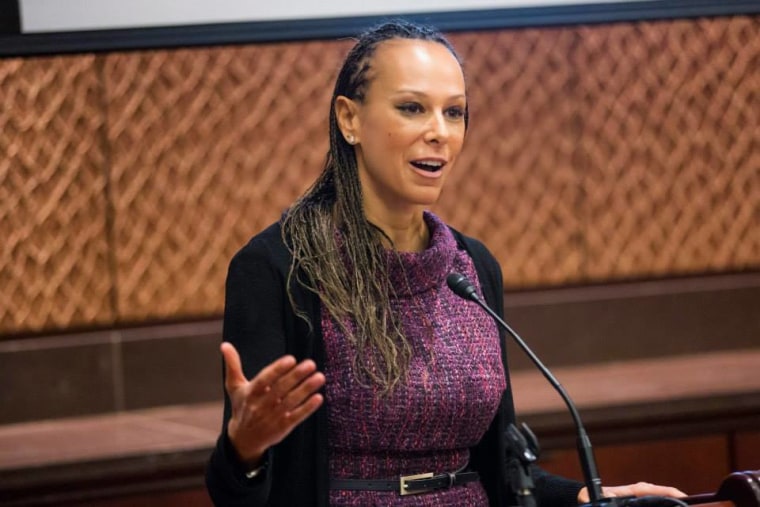March is Women’s History Month, and American women have come a long way since the early days of fighting for the right to vote. But women around the nation and around the globe are still fighting for equality in many realms, including in education, technology, equal pay, and campus sexual assault, and beyond. All month long, msnbc.com is highlighting female leaders who are fighting for the women’s rights issues of 2015.
Malika Saada Saar has dedicated her life to protecting and advocating for the human rights of women and girls. She co-founded the Rebecca Project for Human Rights, a policy and advocacy group that advocates for women and families. Through her work with the Rebecca Project, Saar successfully lobbied for a ban on the practice of restraining incarcerated women during childbirth. She also created Crossing the River, a written and spoken word project for mothers in recovery from substance abuse.
Currently, she serves as the director of the Human Rights Project for Girls, a human rights organization that focuses on curbing gender-based violence through the advancement of public policy and awareness.
Saar answered our questions about her work to make the world safer for women.
Why did you decide to dedicate your life to human rights?
I went to law school in the tradition of Charles Houston and Thurgood Marshall. I appreciated the legacy of civil rights, fought for and won, by those giants of the law and envisioned my own legal career as part of the journey towards bending the arc of moral universe towards justice. But, in time, I became very drawn to braiding together civil rights approaches, to the larger human rights discourse, especially in the context of women and girls' lives.
You have been an advocate for incarcerated women, including successfully lobbying for a ban on the practice of restraining female inmates during labor. Why is this important?
The federal ban on shackling mothers at the time of labor, childbirth and post-delivery was a basic human rights issue. Every child has the right to come into this world free and every mother, regardless of who or where she is, possesses to the right to a healthy, dignified childbirth, unencumbered by the harm and shame of shackles.
What is something that you wish the public knew about child sex-trafficking?
That they are our daughters. That the child sex markets here in the U.S. are not that dissimilar to those in Cambodia, India or Nigeria. It is always the last girl, the most vulnerable girl who is preyed on, who is propertied and who is discarded.
It is also important to take the conversation of child sex trafficking in the U.S. out of the narrative of sex work and prostitution. What happens to these girls is rape. That is why my organization, Human Rights Project for Girls (Rights4Girls) has launched "No Such Thing" to make clear that there is no such thing as a child prostitute, only victims and survivors of child rape. Unfortunately, trafficked children in the U.S. are not treated as victims of child rape. In every state, including the District of Columbia, underage girls are arrested for prostitution--even though many of them are not even of the legal age to consent. The "Johns' are rarely arrested, and in the rare circumstances in which they are arrested, the charge is for misdemeanor solicitation. It is time to stop arresting children who have been subject to commercial rape--and end any distinction between raping a child and paying to rape a child.
Why do you think human rights issues pertaining to women and girls are so often overlooked
In the U.S., we do not frame conditions of rape, sexual assault, domestic violence or sex trafficking as human rights violations. Internationally, however, we do. It is time to connect gender-based violence here at home to the global struggles for women and girls' health, safety and dignity. Women and girls are afforded so many educational and economic opportunities here in the United States. But our women and girls' lives are still cut down or reduced by violence. We cannot turn a blind eye to the levels of violence committed against American women and girls, and we must intersect the realities of gender-based violence in the U.S. to the larger human rights movement for women and girls' safety and dignity.
What is your hope for women of the next generation?
I hope for women and girls of the next generation that we have a world in which our lives are not disposable, that we are not by virtue of being a woman or girl, denigrated, abused, assaulted, or rendered property. I hope for, and work towards, a world for the next generation in which every girl and woman is valued, and can live out her full potential free from violence.
Read the rest of the profiles in our Women’s History Month series here.
This interview has been edited for length and clarity.
